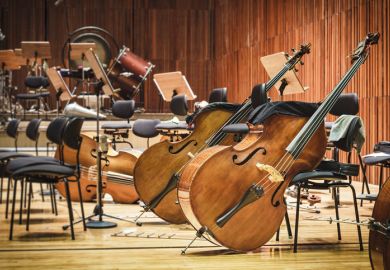After editing a German-language collection of academic articles on Kraftwerk, Uwe Schütte saw a gap in the market for an English-language companion to the band’s music. The resulting well-crafted essay is far more than the “fanzine writ large” that typically characterises such volumes. Cultural theory, history and musicology act as witnesses in a wide-ranging discussion of culture and identity in post-war Germany, focused on the Düsseldorf band and the work produced in their Kling Klang studio.
Although there are occasional quotations from band members, anyone expecting generic sex, drugs and rock’n’roll revelations will be disappointed by the lack of personal information, which echoes Kraftwerk founders Ralf Hütter and Florian Schneider’s notorious reclusiveness. Even Schneider’s departure from the band in 2008 is mentioned, rather than discussed in detail. Instead, Schütte offers a chronological commentary on Kraftwerk’s music, from the prog-rock noodlings of the first three (currently unavailable) albums; through the well-known sequence of electronics-based pop albums from the mid-1970s to the mid-1980s, such as Autobahn, Radio-Activity and Trans-Europe Express; the one subsequent original album in the same style, 2003’s Tour de France: Soundtracks; and the preservation and re-presentation of this music, through remix albums, live performance and live albums.
Through that main sequence, Kraftwerk both imagined the future of music and brought it into being. They incorporated technologies such as synthesisers, sequencers and vocoders as they appeared, pioneering their use both in studio recordings and in live performances that have employed visual technologies such as 3-D projection to enhance the music’s impact. Thanks to these changes, the music has never become a period piece: it has been rebuilt. When the future changed as Germany changed, in 1989, Kraftwerk’s assertive modernism was replaced by postmodern play. The Mix (1991) re-presented classic tracks such as The Robots and Computer Love as electronic dance music, the original recordings beefed up in a recording studio now dominated by samplers and digital effects units. Remasters and live performances since then have continued to transform the material, not to replace it.
Meanwhile, Kraftwerk have become the most influential musicians of their generation. This is a tale often told, and Schütte does it fairly, mentioning the musical debts owed by fans such as hip hop pioneer Afrika Bambaataa and stadium rockers Coldplay. With his wide knowledge of German cultural history, Schütte is rather more enlightening on Kraftwerk’s own influences, particularly in relation to German music. He makes obligatory references to their contemporary, avant-garde composer Karlheinz Stockhausen and to Richard Wagner’s concept of the integrated work of art, or Gesamtkunstwerk – an idea Kraftwerk have acknowledged is reflected in their live shows. Schütte also speculates (in one of many interesting footnotes) that the band’s notion that they produced Alltagsmusik (music for every day) might indicate the influence of 20th-century German composer Paul Hindemith’s idea of Gebrauchsmusik (professionally crafted music for everyday use).
Here’s another possibility. Every German of Hütter and Schneider’s class would have known Engelbert Humperdinck’s Wagnerian children’s opera Hansel and Gretel (1893), wherein the Dew Man sings “Kling” and “Klang” while waking the children. Through the band’s best-known songs, in which minimalist structures build on repeated patterns and lyrics echo the name of their studio, Kraftwerk imagined the musical future from a working environment named after a magical musical moment. They went on to make many of their own.
Andrew Blake is associate lecturer in journalism and publishing at the University of the Arts London.
Kraftwerk: Future Music from Germany
By Uwe Schütte
Penguin, 336pp, £9.99
ISBN 9780141986753
Published 27 February 2020
Register to continue
Why register?
- Registration is free and only takes a moment
- Once registered, you can read 3 articles a month
- Sign up for our newsletter
Subscribe
Or subscribe for unlimited access to:
- Unlimited access to news, views, insights & reviews
- Digital editions
- Digital access to THE’s university and college rankings analysis
Already registered or a current subscriber?








